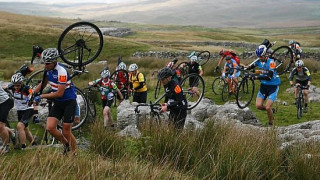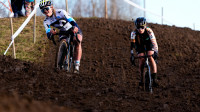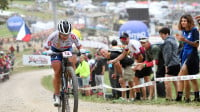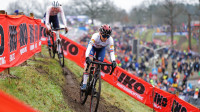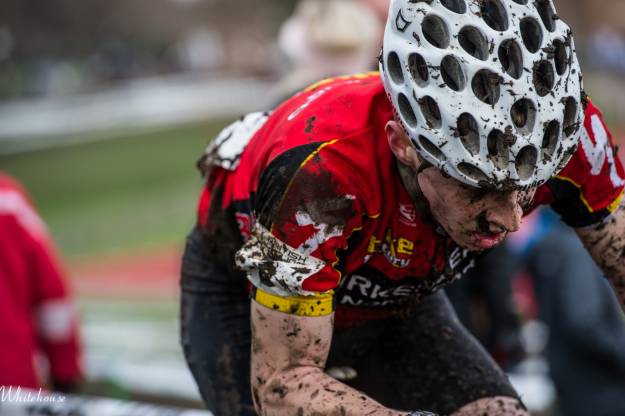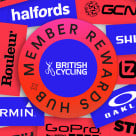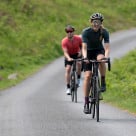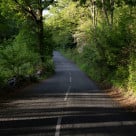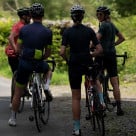The Ramblings of a Three Peaks Obsessive
Posted: 29 Sept 2009 | Link: Race Report & Images
Welcome to the random ramblings of our tame Three Peaks obsessive as he looks back at his various attempts at the race and shares some of his experiences. He encounters epic adventure, soaring emotions and the odd humorous interlude as he tackles 'Cross's toughest challenge.
The sky is a flat grey in every direction. Where Pen-y-Ghent should be, the horizon is sawn off by low mist. The other horizon is dominated by a giant quarry, scratched from the hillside, as though by giant claws. Under my feet, the grass is heavy with autumnal dew. Around me the car-park is filling up steadily. I have a deep-rooted loathing for the final hour or so before any race. I hate the overpowering anticipation, the nerves, the fear of having missed some crucial part of my preparation or forgotten an essential piece of kit, I hate the empty, unknown echo of pains soon to be endured.
Run, walk, ride, carry, stagger, crawl - All forms of locomotion are to be seen at the 'Peaks
This year's Three Peaks Cyclo-Cross race saw my third attempt at this unique event. By rights it should've been my sixth, at least. I first entered back in 2003, but was laid low by a flu virus the week before. A year later I tried again and came down with a food allergy which took six months to sort out. I temporarily gave up at that point and went along in 2005 to watch and see what the fuss was all about. A short morning spent at Cold Cotes, at the foot of the Ingleborough descent - not the most spectacular point of the race by any means - was more than enough to get me hooked. I came away convinced I had to ride the race, if only to sample the atmosphere from a competitor's point of view. The heady mix of a stunning landscape, three monumental climbs and the sheer, ludicrous improbability of tackling them on a fragile ‘Cross bike had grabbed me.
And so, in 2006, I rode and completed the race. I was almost overwhelmed by the experience and genuinely thrilled to have completed the event in one piece. Calling my family to report on my successful attempt, I found myself strangely choked - overcome with the kind of emotion I had only ever felt before at the birth of my daughter. Blimey, I thought, this thing has really got to me.
I entered the 2007 event, only for it to be cancelled because of the foot and mouth outbreak in southern England. But in 2008 I was back again and just over four and a half hours after rolling out from the start at Helwith Bridge, I had finished the race once again - cue more unexpected emotion and euphoria.
And so on to 2009 and with the dew soaking through my shoes, I joined the queue to collect my riding number and timing chip from the incongruously small race HQ. A badly timed cold had settled on me on the Wednesday before the event and for a couple of days I was convinced I wouldn't be able to ride. However, a late rally on the Saturday meant that I was there, a bit chesty, but ready to go again.
Actually, after reading this back, I guess you'd be forgiven if you formed the impression that my life is made up of long bouts of illness, interspersed with the occasion healthy day. In actual fact, the opposite is true: I'm blessed with the constitution of a horse, outside that crucial last week of September!
Whilst talking of the last week of September, there's a small, diplomatically sensitive issue every time I ride the race. Unfortunately it coincides with my wife's birthday or the weekend when it is due to be celebrated. How do you do the decent thing and celebrate properly, but at the same time avoid alcohol and late nights? Well, if you have an understanding wife, it's just possible. The biggest problem is not talking endlessly about the race, when you really need to be at your most sensitive and most attuned to your loved one's needs. It's pure torture as, in common with most men, if there's one thing which will get me talking, it's one of my obsessions.
Keen to tackle the problem, last year I went on the offensive: I persuaded my family to come along and support me at the race and to help my father, who is now my tried and trusted supplier of food and drink at the race's service points. However, the feedback from my wife and daughter after the event was not as positive as I had hoped: "we didn't see much of you, did we?" That was a great opening line. Well, what did they expect? Does Lewis Hamilton's pit crew say the same to him? Didn't' they understand that the less time I spend with them, the better they had done their job?
Then there was my father, drawing me to one side, later that evening, to tell me that they had nearly not made the first service point at Cold Cotes in time. Apparently, whilst all the other support crews were haring down the country lanes intent on getting into position, my other half had decided to call off for morning coffee. My father is, like me, anxious if put under time pressure and he had clearly had a trying time of it as my wife and daughter had tried to balance the job of supporting me with their own expectations of a day out in the Dales. So, when the family announced that, sadly, they would not be coming with me this year, it was not exactly a surprise.

Did you get me? The author crosses the finishing line and checks he's been registered by the timing mat
Whilst we're on the subject of the strange ritual of receiving service at the Three Peaks, it's worth giving it some thought if it's your first time. A good deal of time can be lost if you don't plan your service carefully. My own experiences illustrate this.
Before my first attempt, my father and I thought we had the whole thing under control. We correctly anticipated that the biggest problem would be finding each other amongst the crowds - bear in mind that there are now over 500 riders in the event, the majority of whom will have someone waiting for them at both Cold Cotes and Ribblehead. We came up with the, apparently, foolproof plan that my father would wear a fluorescent tabard - I'd spot him a mile away, wouldn't I?
You can imagine my consternation as I emerged from the mists at Cold Cotes to be greeted by the sight of a crowd of several hundred people strewn down the hillside, the majority of whom seemed to be wearing fluorescent tabards. It looked more like roadworks on the M1 than a rural bike race. More by luck than judgment, we located each other and I fuelled up and shot off into the mists.
When I dropped down towards Ribblehead for the second service, I told myself that the race would now be more spread out and that the crowds of supporters would be smaller. The truth was that there seemed to be even more people waiting in the shadow of the giant viaduct. What's more, they were spread out down half a mile of farm track. Again, the fluorescent tabard seemed to be the garment of choice.
Fate then intervened to add further layers of confusion to an already difficult scenario. I was forced to slow down and pick my way past the eager hoards, all craning their necks, looking for their rider. How would I ever pick out my father? Well, perhaps he would see me and call out to me. That might have worked if, at that moment, an exceptionally well-known and popular local rider who shared my Christian name hadn't cruised up behind me. The crowds on either side erupted. Everyone was calling out his name, keen to wish him well and catch his eye for a friendly wave. Of course it took me a while to register what was going on. To me, it seemed as though suddenly a sea of total strangers had taken it upon themselves to greet me like a long-lost friend. It was only after a number of slow and stressful minutes that I finally located my father, who had helpfully placed himself at the very far end of the service area "so I would stand out" he later told me, grinning, as I related my difficulties to him.
In the two subsequent races, we've evolved a lot more successful strategy of agreeing a precise location to meet and sticking to it. But, if you ever want a bit of a laugh, just go along to the 3-Peaks and watch the attempts of riders to find their support crews. A work colleague managed to get hold of a giant red flag for this year's event and forced his crew to wave it so he could pick them out. If it had been mounted on a pole, it might have been a good plan, but the two hours they spent holding and waving a square of material, which wouldn't have looked out of place streaming from the stern of the Titanic, took a hell of a lot out of them!
But I digress. Returning to this year's event, it was with some relief that I found myself queuing with the 500 plus other riders waiting for the off. Moving off down the road, I kept station in a very twitchy pack, breathless both with the sudden exertion and with laughter at the attempts of a small number of self-appointed peloton police to get some sort of discipline into hundreds of riders, many of whom will never have ridden a Road race. Brakes squealed, voices bellowed, thick knobbled tyres hummed on the tarmac as we rocketed through Horton-in-Ribblesdale.
With well over four hours in the saddle ahead of me, I had planned not to go too hard too soon. So, naturally, I promptly forgot that and arrived at the first off-road section dripping with sweat, wheezing alarmingly and already at my limit. Eventually I settled down as riding gave way, first to pushing and then to carrying the bike.
My preparation for this year's event had included some specific training at my secret local facility. The pain of climbing the near 45 degree slope of Simon Fell had had a seriously detrimental effect on my performance on the subsequent climbs in the 2006 and 2008 events and this time I was determined to prepare myself for the steepness and length of that crucial first climb.
I live in the Pennines, but finding a suitably accessible and steep hillside on which to train proved more difficult than expected. That was until I remembered a tale I'd heard a few years ago of a rider who trained for the event by scaling the grass-covered dam bank of a local reservoir. A recce ride to the reservoir revealed that it could have been made with preparing for the Three Peaks in mind. The banking was steep and smoothly grassed. It was also higher than I had expected - a quick count of the flight of concrete steps which ran up the face of it and bit of mental arithmetic later and I realised I had found the perfect 200 foot high training climb.
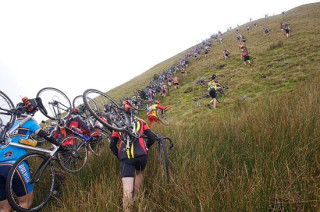
Prepare for this or prepare to fail!
If this sounds a bit extreme, I hold my hands up - guilty as charged, but if you have ever ridden the Peaks and cursed as you fitness and strength ebb away as you clamber, crab and stagger up that first wall of a climb will understand that anything which reduces the debilitating suffering is a good idea. It's also an event which amounts to an obsession to many of us. Anyway, three times a week for three weeks I rode the 10 minutes up to the dam and clambered up the banking four times. My first effort took almost 4 minutes but by the time I was winding down my training I had got that down to under three minutes. So, I hear you all cry, how much faster did you go as a result of the training?
Well, the evidence is that it did nothing to speed me up. My first attempt at the race, in 2006, was blighted by two punctures. The second attempt saw me pick up only one and I went 3 minutes quicker - saving very close to the amount of time it takes me to change a tube. This time I avoided punctures altogether and went three minutes quicker again. So, if you exclude the flats, my time for the event has pretty much flat-lined. Having said that, I may not have gone any quicker this time, but I felt a lot more comfortable on the climbs and I will have no hesitation in repeating the grass bank training next year. If only to avoid the pain of Simon Fell.
Back to the race and I guess I'd better cut to the chase and pick out a few personal highlights of this year's event.
Having made a reasonable start and got myself over Ingleborough in decent fettle, I then proceeded to make a complete pig's ear of the road section up to Whernside. This is a straightforward run, which is a great opportunity to catch a lift on a faster rider's wheel and grab some food and drink. If only!
I first chose to eat a bag of crisps - and don't all email in telling me off for my antiquated re-fueling habits, it works for me - on the downhill section from Cold Cotes to Ingleton and only succeeded in inhaling most of the crisp fragments as the slipstream upended the bag into my face. I then coughed them up for a couple of miles, missing several passing wheels in the process, before finally trying to settle myself down with a drink. I promptly dropped my nearly full bottle and had to stop and retrieve it. Streams of riders seemed to be passing me and I totally lost my rhythm.
Luckily, the bulk of Whernside rearing up ahead of me seemed to re-focus my thoughts and by the time I was off and carrying my bike again I was back in the groove. Whernside was the only hilltop not wreathed in cloud and I took the time as I cycled along the ridge to look around me. The railway viaduct lay far below. All around, the high hills of the western dales rippled into the distance. Dentdale nestled close by and, on the horizon, the Howgills' round backed summits were clearly visible. I then made the mistake of pointing out to another rider that the views were superb. He gave me a strange look and rode on in silence.
The descent off Whernside is a cracker. It's technical, varied and very exciting, with narrow lines and lots of potential trouble. However, it flies by in a whirl of dust and you're soon onto the long road section down to Horton-in-Ribblesdale and the foot of Pen-y-Ghent.
From there, it's reputed to be one hour to the finish. All I know is that the climb, much of it rideable, is where you learn more about your fitness than you ever wanted to know. I've suffered cramp there in the past but, thanks perhaps to the nasally ingested crisps, I didn't this time and although tired, I made good progress, even getting a round of applause for a clean ride through the tricky rock section half way up the walled track.
Out on the upper slopes of the mountain, riding stopped, walking began and the mists descended. It's this section which sees one of the strange rituals of the event: as you climb grimly upwards, you are met by faster riders coming down. The protocol seems to be to offer a grim smile and a nod of the head if you are on the way up and a cheery grin and a shout of encouragement if you are on the way down. In truth, there's a sub-plot, with those coming down effectively saying "I've beaten you" and those coming up having to soak up the inevitability of the situation. For me there's always been the shock of seeing riders descending who you think you should beat. Similarly, on the way down there's a flood of pride as you see riders you respect still making their way up the slopes.

Some bike race. This is the view of Simon Fell riders get 15 minutes in
Finally, at the top of the final peak, it's impossible not to feel a premature sense that you've finished. The back-breaking climbing is indeed done, but there's still perhaps the most dangerous descent ahead of you, a heart-in-the-mouth ride with other cyclists, senses deadened by exhaustion, climbing head-down towards you.
I managed to have another of my less organized interludes as I began to come back down, picking the wrong lines repeatedly and then falling heavily onto rocks as I failed to unclip cleanly for a short stretch of running. I got up, pride hurt, but otherwise OK and from then on got things back together fairly well.
A quick word at this point about the timing in this year's event. As we signed on, we were all given a demo of the timing mats, which would be on each mountain top. Riders of big enduros and sportives will be familiar with these mats, which look like large strips of carpet. I idly wondered who would have the arduous task of hauling them to the summits. I needn't have worried. The mat on Ingleborough was small, but nothing compared to the tiny squares of material on the tops of the other two mountains. And to add to the slightly comic effect, they were mounted in such a way that you couldn't ride over them, but instead had to wave a leg at them as you passed by. It was very effective, but it did remind me more of a dog cocking a leg at a lamppost than it ought to have done.
A final timing challenge awaited at the finish, where the mats do require a degree of co-operation from the riders and several individuals had to return to re-cross them, having won hectic sprint finishes, but failed to register with the sensors. It was all taken in good spirit by the majority, as was the gravel surface of the final turn into the finish, which caught out a surprisingly large number of riders who had ridden the 5000 plus feet of ups and downs without an crash only to slide to earth within touching distance of the finish line and under the eye of race's merciless commentator.
My own run into the finish was not without incident. I emerged at the bottom of the Pen-y-Ghent path in Horton and forked left out onto the road under the careful guidance of a busy marshal, placed there to help riders integrate with the passing traffic. To my surprise I emerged alongside a police car and for a few uncomfortable moments I had visions of being pulled over for dangerous riding as we "proceeded" - to use a policing term - side-by-side. One of my more vocal Yorkshire Cyclo-Cross acquaintances, watching at the road-side, witnessed the incident and enjoyed himself immensely shouting a loud warning to me and then bellowing with laughter.
The final couple of miles into the finish on the road are, on paper, an anti-climax, but are actually the scene of a number of very small, very short road races, often featuring half a dozen or less riders, who battle like Tour pros to gain an extra place at the finish. I duly got involved in a peloton of four and just lost the bunch sprint. In my first Three Peaks I became so engrossed in a last-gasp battle with another rider that I overshot the final turn and had to do a u-turn and crawl over the line with my tail between my legs. It's that kind of race - there's always something happening, always a fresh challenge just around the corner.
The finish, when you reach it, is a massive relief. It's also a great social gathering as you catch up with your mates, share tales of the day and hear the news of another inevitable Rob Jebb win. Only this time, it didn't quite finish like that, did it? "Cyclist wins bike race" quipped one rider in a reference to Mr Jebb's status as a runner first and foremost and a cyclist second, the opposite of that of the victorious Mr Craig. To me it's just incredible that someone can complete an event which takes me four and a half hours of extreme effort, in less than three hours. It's a mystery how they do it and I'll be back again next year to explore the mystery again.


